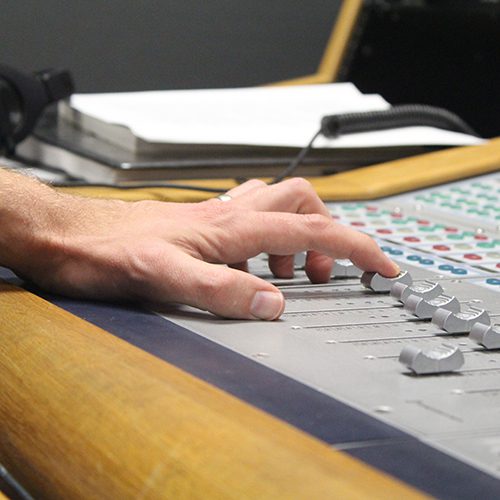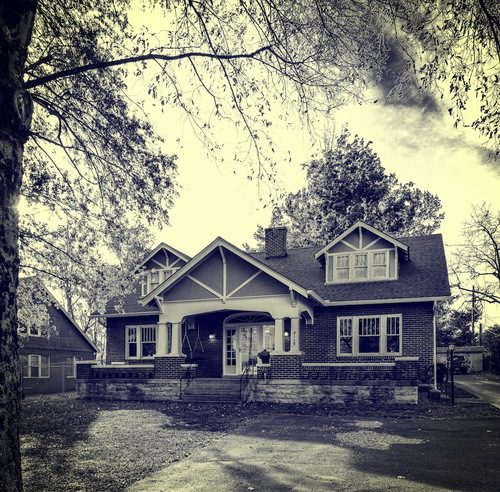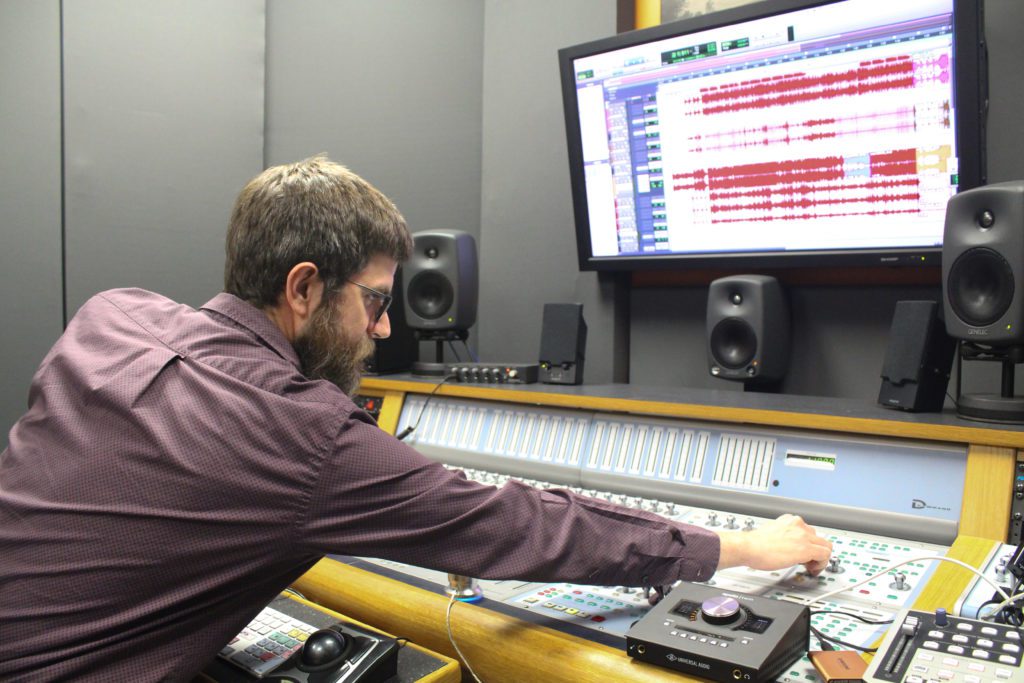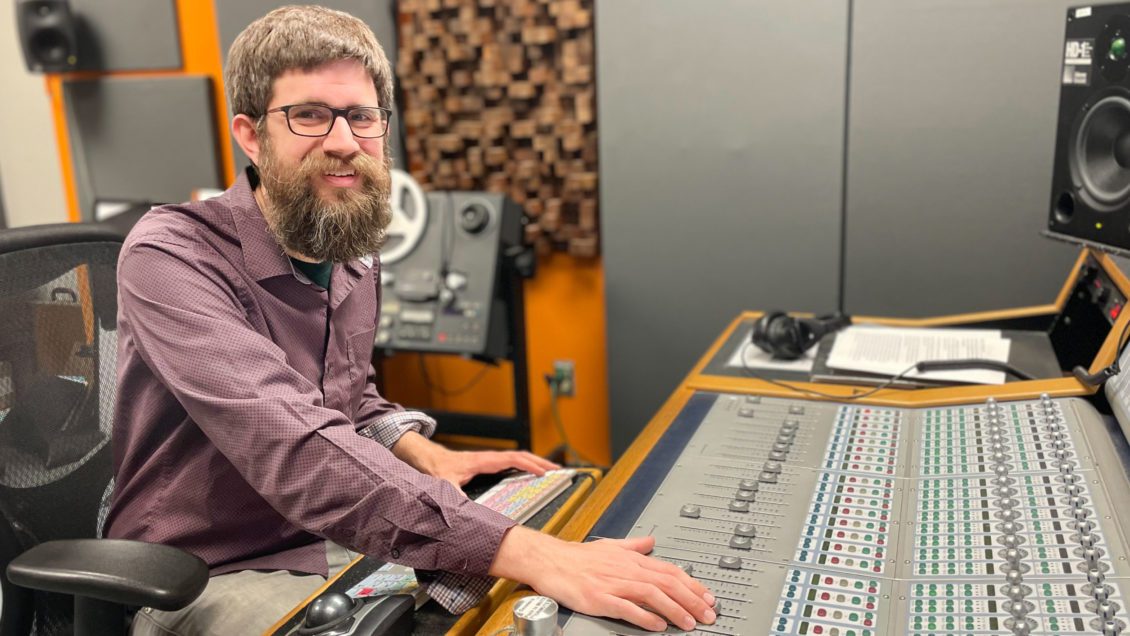For Dewey Boyd, ’08, the path to success as an audio engineer has been as unique and unpredictable as the songs he records.
“You can’t plot this out. It’s not repeatable,” he says. “As a Christian, I certainly think it’s the providence of God.”
Last year, Boyd was accepted as a member of the Recording Academy, the organization which presents the GRAMMY Awards. He is the producer, engineer and owner of Forty-One Fifteen, a recording studio in Nashville. For the first time, he has had the chance to vote on the recording industry’s most high-profile awards, which will be announced on April 3.
Boyd’s interest in audio engineering grew out of his love for music which began as early as elementary school.
“I started writing music and I wanted to record myself. This was with a cassette deck and a keyboard. I had no idea about multi-track recording and hadn’t gone down the rabbit-hole about how records were made.”
In middle school, he began helping audio technicians at his church, trying to meet the needs of a large worship team, and by the time he was a teenager at T.L. Hanna High School, he was becoming confident in his skills.
“At school events, if the sound was terrible, I would go over to the person running sound and kind of kick them out and fix it,” he said.
Stumbling into success
He enrolled at Clemson as a mechanical engineering major, but continued to gravitate towards music, spending time at the Brooks Center practice rooms, “always banging on a piano.” He said he wasn’t aware of the audio technology classes until a friend connected him with Professor Bruce Whisler in the Department of Performing Arts.
“I more or less begged my way into one of the entry-level courses that someone who wasn’t in the major shouldn’t have been able to get into,” Boyd said. “Even though I was in a different major, I was super interested.”
Keep moving in the direction that you think you ought to go, and at some point, you will begin to stumble on things that you didn’t realize were advantages you have.
Dewey Boyd
He says that his classes in the Brooks Center were his first exposure to Pro Tools editing software and multi-track mixing. After his first entry-level audio class, he was able to find a way into more advanced audio technology courses, eventually completing the capstone project, which was a 45-minute CD. His undergraduate thesis for the Honors College also centered on audio technology, focusing on analog-to-digital signal converters.

“This was a safe place to makes mistakes because there isn’t a paying client on the other side,” he said.
After earning his undergraduate degree, he began to pursue a master’s in mechanical engineering but soon realized he needed a change.
“It took going to graduate school to realize it was too hard to do if you don’t really love it,” he said. “I didn’t really want to work in research and development, and that’s where I was headed.”
He and his wife, Natalie, took a leap of faith and moved to Nashville, where he quickly learned that finding a way to break into the music industry was tricky.
“I floundered around for a couple months,” he remembers. “People at church would ask me how my career was going, and I’d say, ‘it’s not!’”
“You can’t plot this out”
At last, he caught his first break in the form of a coffee meeting with veteran audio engineer Shane D. Wilson, which led to an internship, which led to more opportunities with a string of names across the Nashville music scene.
“My first paid gig in Nashville was cleaning out Charlie Peacock’s attic, so I stumbled into the making of the Civil Wars’ first EP, ‘Poison & Wine,’ that sort of launched their career,” he said. Soon after, a chance to help producer Paul Moak move his equipment turned into a job that Boyd held for three years.
“I found that it was advisable to do manual labor for people in the industry,” Boyd quipped.
His work with Moak led him to traveling with and mixing for Country Music Hall of Fame legend Ricky Skaggs, which he called “the greatest side-hustle I could imagine,” where he gained deeper connections into bluegrass music.

In 2012 he was able to purchase a historic home in east Nashville and convert it into a recording studio: Forty-one Fifteen. The studio promises artists “a safe-haven for musicians, bands and songwriters who seek to push boundaries and create honest, genuine, out-of-the-box content, unconstrained by clinical atmosphere or oppressive rates.”
A GRAMMY-winning engineer who rents space at the studio, Shani Ghandi, gave Boyd the prompting that he needed to join the Recording Academy. He submitted his application along with recommendations from Ghandi and engineer Russ Long and was accepted.
“I was thrilled,” Boyd said. “It’s kind of bizarre to read the qualifications and to realize I am actually qualified now to do this.”
Boyd is quick to deflect credit for his achievement.
“I was given this trajectory where I’m repeatedly running up against my ability to control my own destiny,” he says.
He remains an engaged Clemson alumnus, returning to campus annually to work with audio technology students in the College of Architecture, Arts and Humanities to give them insight into the recording industry. His experience has led him to give complex advice for any student looking to follow in his footsteps.
“It’s not as simple as ‘find your own path.’ It’s a bit more nuanced,” he says. “First of all, practice. Keep trying. Keep moving in the direction that you think you ought to go, and at some point, you will begin to stumble on things that you didn’t realize were advantages you have.”

Get in touch and we will connect you with the author or another expert.
Or email us at news@clemson.edu

